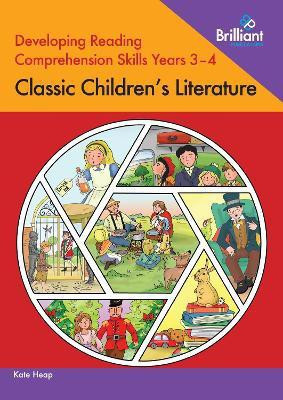Developing Reading Comprehension Skills Years 3-4: Classic Children's Literature(English, Paperback, Heap Kate)
Quick Overview
Product Price Comparison
Contains 12 high-quality extracts from classic children's stories and is perfect for developing reading strategies as children move through Key Stage Two. Each of the extracts from classic children's literature is accompanied by eight sets of questions based on the Key Stage 2 (KS2) Reading Content Domains and National Curriculum. This reading workbook for Years 3 and 4 provides opportunities for children to study more complex vocabulary and so build their own. They can also explore how the authors language effects their readers whilst developing endurance for longer passages. Inference activities show the depth of children's understanding of the extracts. The clear structure and the author's passion for literature make Developing Reading Comprehension Skills Years 3-4: Classic Children's Literature invaluable for everyone working on literacy development with 7-8 and 9-10 year olds. Support for teachers, and parents who are homeschooling, is built in with guidance for how to teach the different question types, plus suggestions for embedding these texts in the wider KS2 English curriculum. These resources are suitable for new and recently qualified teachers as well as those who are more experienced and wanting to expand the range of texts they use as classroom practice materials and for guided reading. If you are a teacher, tutor or parent looking for a comprehensive teacher resource to enhance reflective reading and support teaching in your classroom or home education, this is exactly what you need. Look for other books in the Developing Reading Comprehension Skills series, including Years 5-6: Classic Children's Literature, Years 3-4: Classic Poetry and Years 5-6: Classic Poetry. This book contains extracts from the following classic novels: The Tale of Jemima Puddle-duck by Beatrix Potter The Wonderful Wizard of Oz by L. Frank Baum Alice's Adventures in Wonderland by Lewis Carroll The Story of Dr Dolittle by Hugh Lofting Little House on the Prairie byLaura Ingalls Wilder The Velveteen Rabbit by Margery Williams The Magic Bedknob by Mary Norton The Railway Children by E. Nesbit Peter Pan by J. M. Barrie The Nutcracker and the Mouse-King by E. T. A. Hoffmann The Wind in the Willows by Kenneth Grahame The Prince and the Pauper by Mark Twain This is one book in a series of 8 Developing Reading Comprehension Skills . The other books are: Classic Children's Literature, Years 5-6 Classic Poetry, Years 5-6 Classic Poetry, Years 3-4 Contemporary Children's Literature, Years 5-6 Contemporary Children's Literature, Years 3-4 Non-fiction, Years 5-6 Non-fiction, Years 3-4


